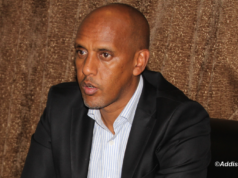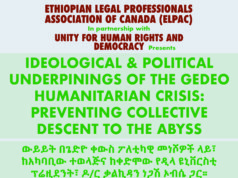This short article refers to the ongoing heated debate about Fikre Tolossa’s book on the origin of Oromo and Amhara. My intention is not to intervene in the debate by supporting this or that side; nor is it to contribute a missing piece to the debate. I openly confess that I have not read the book; more yet, I do not intend to read it. By contrast, I have read some of the reviews, which clearly indicated to me that the dispute has to do more with ideological positions than with scientific accuracy. Those who reject the book denounce the lack of credible materials in support of the allegation of a common origin of Amhara and Oromo; those who defend the book do so because it counters the discourse of secessionist Oromo who speak of the Ethiopian colonization of the Oromo.
I say the whole debate is ideological because veracity matters little for the issue at hand. The supporters of the idea of a common origin think that it will significantly decrease the ethnic tension between Oromo and Amhara. If Oromo and Amhara are related, then the arguments of secessionist Oromo go down in flames. On the other hand, those who maintain that the idea of a common origin is just a fantasy actually share the same assumption only to say that the idea is unfortunately untrue. They do believe that the attempt to base Ethiopian unity on a fantasy is a dangerous game if only because it misunderstands and underestimates the Oromo grievances. Still, instead of confronting the supporters of the idea of a common origin with political arguments, they try to refute the scientific value of the book. In so doing, not only do they miss the political dimension of ethnic conflicts, but they also engage in a genealogical argument as though things would have been different if indeed Oromo and Amhara had the same origin.
The bare truth is that ethnic conflictis not about having or not having a common origin, religion, or language. Take the case of the Somali: you have literally people with almost identical features in what defines them as a distinct group. Yet the Somali state collapsed and was replaced by smaller hostile states. Another highly relevant example is the growing hostility between Amhara and Tigreans: though they formed a political union that goes back centuries and share crucial defining features, many Tigreans consider themselves as a separate nation. The conflict between Sunnites and Shiites is another example: the identity of race and language could not prevent the proliferation of hostile divisions in the Arab world over an issue that can be considered minor.
One could multiply examples proving that ethnic conflict is less about genealogy and more about politics. Equally obvious is that the appropriate response to a political issue can only be political. To turn it into a genealogical dispute is to evade the issue altogether. And in saying that it is political, one essentially involves elites and their competition for the control of power. That politics is about elites, mere commonsense establishes it for the simple reason that two ordinary people living side by side have no cause to quarrel. Why would the fact that the Oromo speak a different language and have different customs antagonize the Amhara or vice versa, unless there is an underlying competition for the control of power? If you take away the desire to rule, control, and expand, you have no business with politics. The old Marx knew this: he specifically attributed the rise of the state to the emergence of classes.
The whole method of ethnic politics is to construe cultural characteristics into an instrument of organization and mobilization, as confirmed by the expression “politicization of ethnicity.” Elites invent discourses whereby what is just a legitimate and apolitical cultural difference turns into a reason for hostility, mostly through dichotomic valorization contriving the superiority or inferiority of a given culture. The invention of suspicion and hostility enables elites to call for the unification and mobilization of ethnic groups under their leadershipand for the control of power to assert or counter the claim to superiority. Once this stage of mobilization is reached, the attempt to dilute or disprove ethnic mobilization is little efficient. Not only is such a solution inadequate, but more importantly, it is also dangerous because it is inappropriate.
The real and only solution is political means the reaching of a viable consensus among competing elites. The consensus must be about power-sharing prior to any election or the verdict of the people. Election cannot be used to marginalize or eliminate rival elites, especially if these elites come from minority ethnic groups. The role of election must be to legitimize the consensus that was reached and make it operational in terms of governmental organization and legislation. Accordingly, the process requires the establishment of democratic rights allowing elites to freely speak and compete while an equally free popular verdict delivers the final arbitration so that the competition between elites remain peaceful.In a word, it is about real decentralization of power by which alone competing elites can have a say in the running of the country.


























Prof. Mesay,
I wanted to thank you for this piece but I did not. Here are my reasons.
First, I hate the word “ethnic” and the characterization of its politics as “ethnicity” because it is invariably (but I would say cleverly) used to undermine the cause of people with national question. Nationalists that frame and advance national question are also seen in the same light denigrating them. Much worse are Amaric words such as “zëër”, “gööte” and “zëëwge” taken as equivalent to “ethnic”, the politics as “zëëregenet”, “göötegnet” and “zëëwgegnet” as if words “bëëher” and “bëëhertegenet” do not exist. Oromo as well as Amara are nations; there are many others too in Ethiopia. I often see guys in the “unionist” camp use “ethnic” and “ethnicity”, “zëër”, “gööte” and “zëëwge” in derogation. In the above piece, Prof. Mesay uses the “ethnic” which I will call from now onwards as the “e” word. In fact, he has used the Amaric words too in several talks he gave. Now the use of the “e” word is so widespred that not only “unionists” but nationalists as well use (rather misuse)it. The effect is relegating an importan issued to all stake holders particularly with intention to undermine the cause of nationalists. I feel it is a disgrace.
Second, lexicology aside, I do not understand why Prof. Mesay does not want to read Dr. Fekre’s book. As an established academic, it makes sense if he declines to “intervene in the debate by supporting this or that side”, but to say “I’ll not read it” because “reviews” have shown me what to expect is terribly unprofessorial. Rather than arrogantly reject a book about which much is being said and written, I would expect the professor to read it (even reread it if there be the need) and raise his incisive pen to disect facts to teach others. Here is a catch, though. Despite what Prof.Mesay says in public, I have a hunch that he will read it. Personally, I found it an impressive work because it is all about the common origin of the Oromo and Amara. Anthropologically speaking, we’re all Homo sapiens who existed in presnet day Ethiopia before we branched into the Cushetic (Oromo, Somali and Afar) and Semetic (Amara and Tigre) socio-cultural and lingusic communities. None us came from far except we’re mixed with new comers such as Arabs, Nilo saharan and Omotic people. Be it a myth or other, anything that suggests the common ancestor of the two major nations is good.
Third, to say the “whole debate (on Dr. Fekre’s book) is ideological” is to be an out and out reductionist. Seeing the discussion on the book as an attempt by “Oromo and Amhara” nationalists to make their point of “common origin” or “oneness” by capturing the entire discussion by one word i.e. “ideology” emanates from not knowing what the book is all about. If and when Prof. Mesay reads the observation, he might say – “here goes another idiot” – but the truth of the matter is the book is important contribution that must be read. It has depth and bredth than the way nationalists see their respective causes; it is about Ethiopia, its origin and its people.
Fourth, what prof. Mesay calls “ethnicity” (which I call nationalism) is indeed, though partly, about having or not having a common origin, religion, or language. In fact, it is a lot more than that which I will not dwell on at the moment. Scotish, Catalonian and Quebecois nationalism are about all the things you fail to see as nationalism. These nations all live in a mature democracy (in the U.K., Spain and Canada respectively) but they want to be recognized as nations and have their own country. Scotts have no quarrel with the Irish, Walesh or British, but they want a country. The same is to true to Catalonians and Quebecois. That’s why some people say your suggested solution that democracy solves national issue is only a part of the solution. It makes no sense to say millions of Scotts and Quebecois who had a referendum were manipulated by elites into believing that they need a separate state. Democracy might have prevented separation, but both referendums show that almost half the populations of the nations voted for a separate country. I have trouble with an acadmemic like Dr. Messay who reduce national question to elite dysfunction. Elites frame issues and advance the question, but they do not make decisions; people do. Rather than lament the role of elites, it is better to study how U.K. and Canada remined united. It is definetly not by castigating elites who frame and advance nationalism and not even by denying people the right to self-determination. The good Prof. should look look into how unity is preserved where there is nascent nationalism.
No need to comment on Somalia since it cannot be an example to refute national issue.
Fifth, the worst part of Prof. Mesay’s opinion is the last paragraph which concludes his write-up. He says: “the real and only solution is political means the reaching of a viable consensus among competing elites. The consensus must be about power-sharing prior to any election”. Again, it is sad how learned people miss the depth and width of nationalism. Prof. Mesay’s suggestion is to bribe the elites. He says elites are after power and give them their share and the issue of nationalism will go away. I sicerely doubt if nationalism is about sharing power although some elites might have such hidden interest. But an entire nation with its constituent population cannot be corrupted by sharing power. That’s what happened in U.K. and Canada. You cannot simply tell a nation that you are part of power sharing and expect them to be content. It is about having a country or no country.
Finally, unionist elites should come up with a real solution to national issue in Ethiopia beyond corrupting nationalists with power sharing. That path is undemocratic and bound to fail. How about studying the experience of U.K. and Canada than look for a quick which will never work?
“The bare truth is that ethnic conflicts not about having or not having a common origin, religion, or language.” If you allow me to elaborate?
Ethnic differences are mainly initiated and exacerbated by the elites. This elites have motive beyond the ethnic equality of the people that they claim representing, that is money, profession, fame, e.t.c
If these aren’t BANDAs? who is? Ethiopians, who sold Egg to the Italians were labeled as BANDA.
Excellent post. I was checking constantly this blog
and I am impressed! Very helpful info particularly the last part :
) I care for such info much. I was seeking this particular information for a long time.
Thank you and good luck.